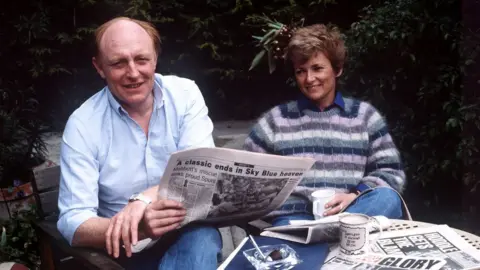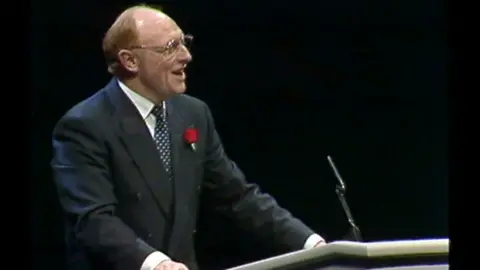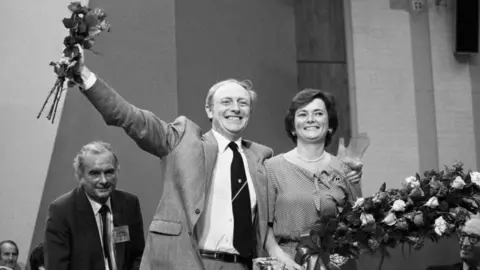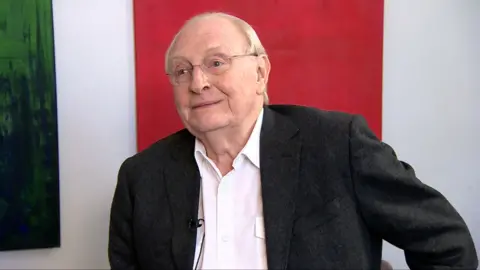Alzheimer's: Neil Kinnock supporting wife through disease
Former Labour leader Neil Kinnock has spoken of the importance of supporting his wife, who has Alzheimer's.
Glenys Kinnock, a lifelong socialist campaigner, had been "not just a rock, but a continent of rocks" for the peer, he said.
"I don't think of it as payback, but if I did, I still have a hell of a lot more to do," Lord Kinnock said in an interview marking his 80th birthday.
His family had been "fundamental" to him during his career, he said.
"That's an understatement. I was very fortunate in the family that raised me," Lord Kinnock said in the wide-ranging interview with BBC Radio Wales Breakfast, in which he also talked about his views on the current state of the Labour Party and devolution in Wales.
His grandparents were "terrific" and aunts and uncles were "friends to death" and always ready with advice and a joke, he said.
But his wife, a former Member of the European Parliament (MEP), had always been there for him, in particular during the nine years he led the Labour Party, he said. Being there for her now "helps", he said.
"She gets frustrated, obviously, sometimes terribly so."
 Mirrorpix/Getty Images
Mirrorpix/Getty ImagesAlthough the disease is irreversible, his wife nonetheless remained outward looking and good company, Lord Kinnock said.
"The great thing about Glenys is she has retained her sense of merriment."
'Think twice'
Lord Kinnock succeeded Michael Foot as Labour leader following the party's 1983 defeat to Margaret Thatcher. Labour only won a little under 28% of the vote.
He became the youngest leader in the party's history and remained at the helm until the party was defeated in the 1992 general election by John Major.
Mrs Thatcher dominated politics in the 1980s and became a divisive figure in Wales for her refusal to protect the mining industry.
Lord Kinnock, who launched many attacks on the former prime minister during his years as opposition leader, said his opinion of her had not softened over the years.
"I don't think she was doing it out of wickedness. I think she was doing it out of doctrine," he said of the reforms she oversaw.

Who is Neil Kinnock?

- Neil Kinnock was elected as MP for Bedwellty in 1970 and later Islwyn
- After Labour suffered a heavy defeat in the 1983 General Election, he became the party's youngest leader at the age of 41
- Labour lost the 1987 and 1992 elections while he was leader, but increased the number of their MPs in Parliament each time
- He stood down following the second defeat and has since admitted his notorious pre-election rally in Sheffield a week before the polls struck the wrong triumphalist tone when he was shown calling out "we're all right" or "well all right"
- During his time as leader he persuaded his party to abandon its radical policies on disarmament and large-scale nationalisation
- His wife Glenys was elected to the European Parliament in 1994, representing South Wales East, and was re-elected in 1999 and 2004 to represent Wales. After receiving a life-peerage in 2009, she served as a minister of state in the Labour government

"And whilst doctrine can be handy as a navigation compass... doctrine applied in an ideological and absolutist way can be very destructive."
The peer is widely regarded as having been instrumental in moving the party towards the centre and softening its image. Under his leadership, Labour abandoned more radical positions; its previous campaign manifesto included policies such as nuclear disarmament and nationalisation of banks.
 PA
PA"I knew it was going to be a very very very tough job and I knew it was going to be a long job. Because there were several policy changes that had to be made to restore the credibility of the Labour Party," he said.
"There were elements in the Labour Party that had to be either convinced, or defeated, and some ejected, in order to rebuild the reputation of the Labour Party as a democratic, socialist, progressive party."
Some people have argued that New Labour's success was built on the foundations Lord Kinnock laid.
"But if I'd really known how long it was going to be... and the idea that it would stretch out for nine years and then conclude with narrow defeat, I think I would have thought twice," he said.
'Reputational repair'
After leading the fight against left-wing extremism in the Labour Party in the 1980s, Lord Kinnock said the departure of Jeremy Corbyn after the 2019 election defeat was "a significant blessing".
Lord Kinnock had urged Mr Corbyn to "do his duty" and resign in 2016.
"The repair of Labour's reputation for being a rational, patriotic party offering a serious alternative as a government, that is well under way. But of course, it's a detour we should never ever have taken," he said.
"We're in a much better state than we were in in 2019."
Keir Starmer, he added, had also been key in getting to that position.

"He's got the high intelligence and critically the maturity, the sheer adulthood, that offers such a strong contrast in terms of political leadership to the man who is prime minister. That is bound to be appealing."
Separatism 'not the answer'
With pro-independence groups in Wales seeing a rapid rise in membership, Lord Kinnock said he fully understood and in many respects shared people's frustration and resentment.
But separating from the rest of the UK was "not the answer", he said.
"We would submit ourselves to the most appalling economic catastrophe. In the end it is economic stupidity," Lord Kinnock said.
"We have got to have fundamental regard for the stability and security and prosperity of the people of Wales."
Political change, for the moment, would have to come from London, and not through any form of separation.
"Wales thrives when we are outward looking. We go into depression and disadvantage when we are forced to be inward looking. We really do need the influx of investment and modern employment."
"These are really bleak times for the world, and for our country," he said, referring to Brexit, the Covid pandemic, the war in Ukraine and climate change.
But despite huge crises to be overcome, globally and in the UK, he remained, at 80, "a sort of optimist".

- HOW COVID MADE THE SENEDD MATTER: Welsh politics and politicians became interesting
- LESSONS FROM LOCKDOWN: How has the experience of lockdown changed us?

